Unit 1 How can we become good learners. Section B(2a_2e)课件26张
文档属性
| 名称 | Unit 1 How can we become good learners. Section B(2a_2e)课件26张 | 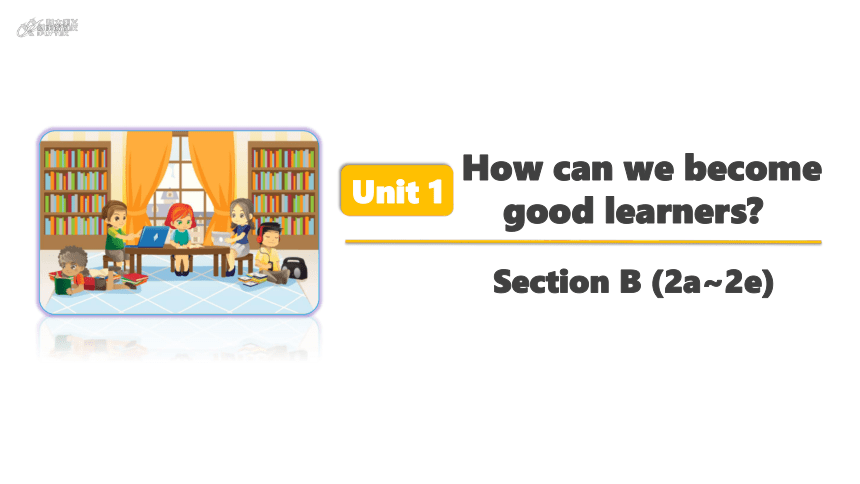 | |
| 格式 | pptx | ||
| 文件大小 | 10.9MB | ||
| 资源类型 | 教案 | ||
| 版本资源 | 人教新目标(Go for it)版 | ||
| 科目 | 英语 | ||
| 更新时间 | 2022-04-02 17:43:26 | ||
图片预览

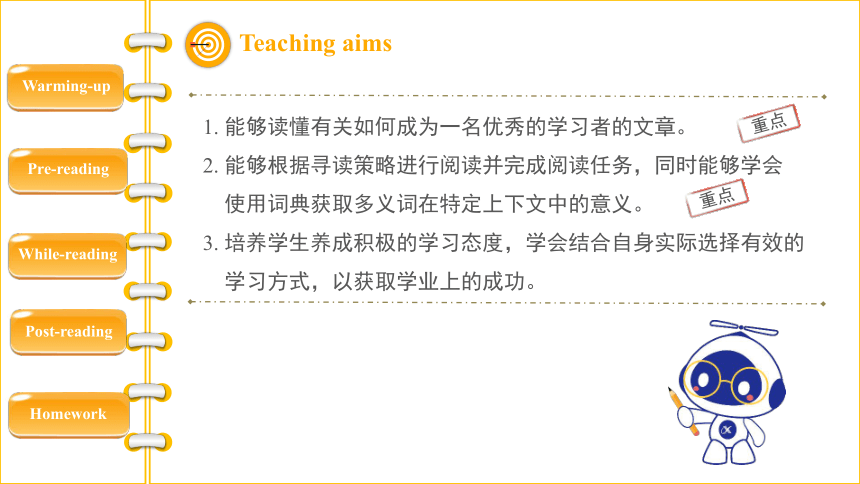
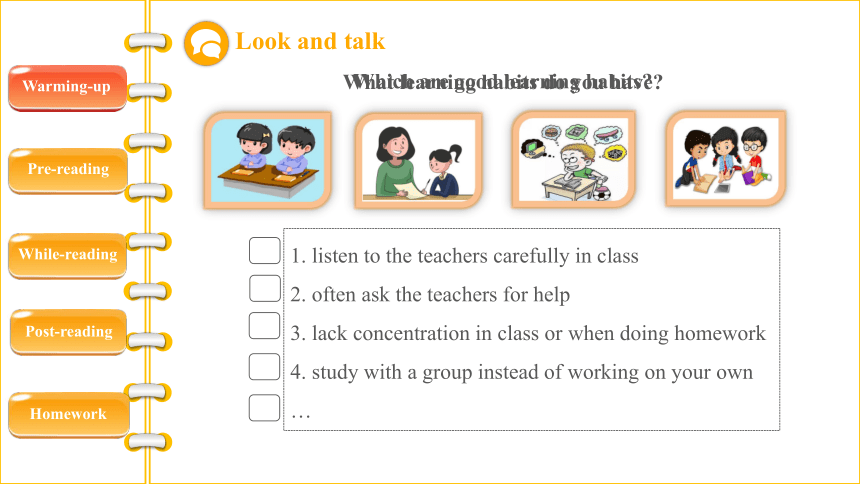
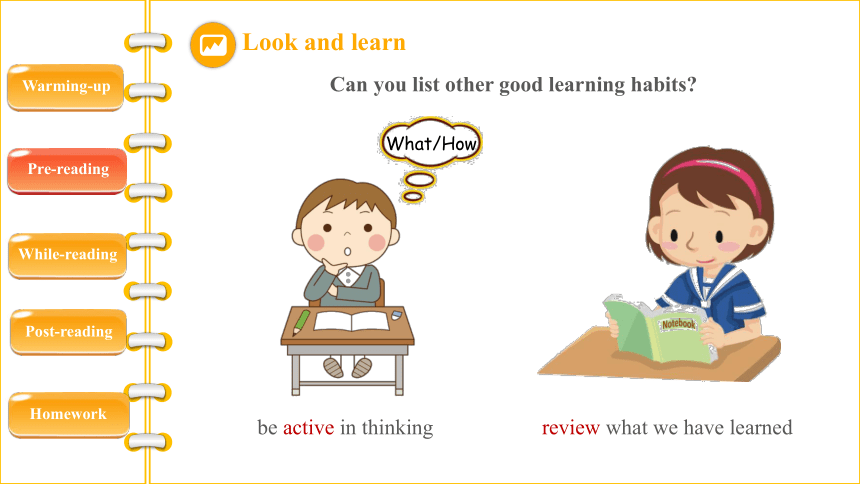
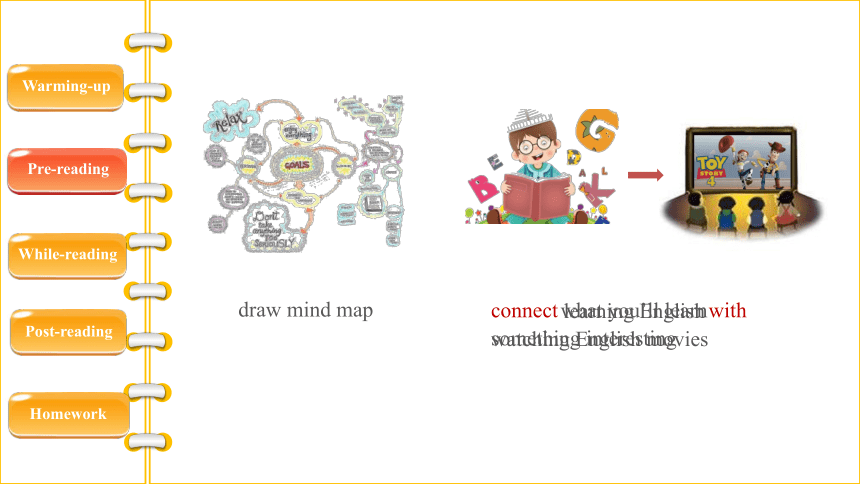
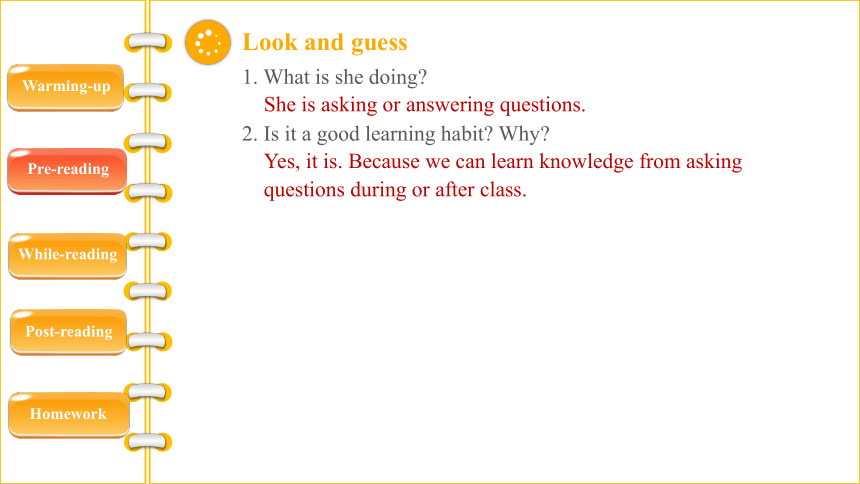
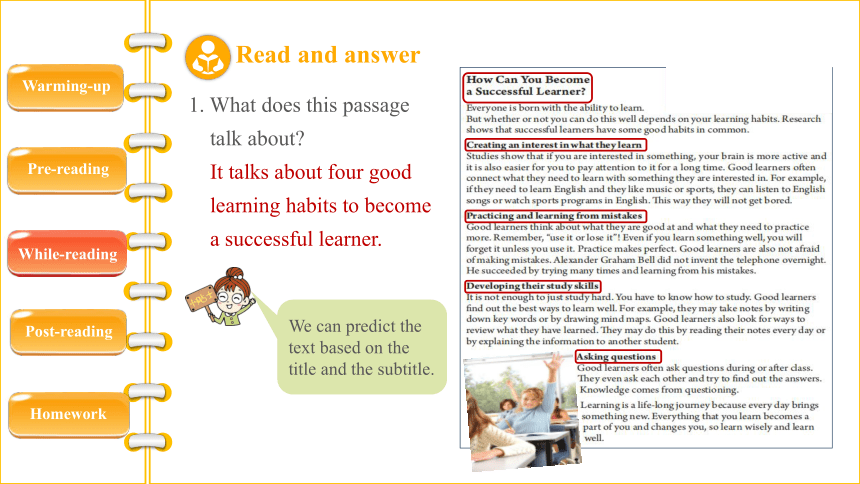
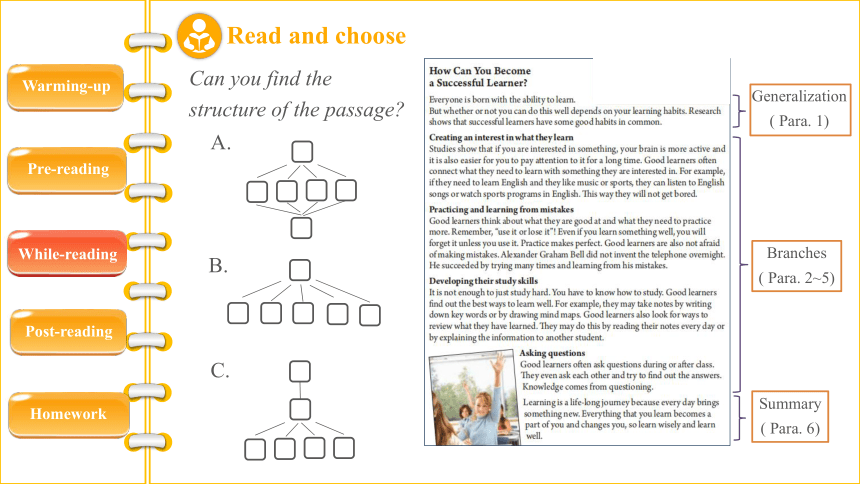
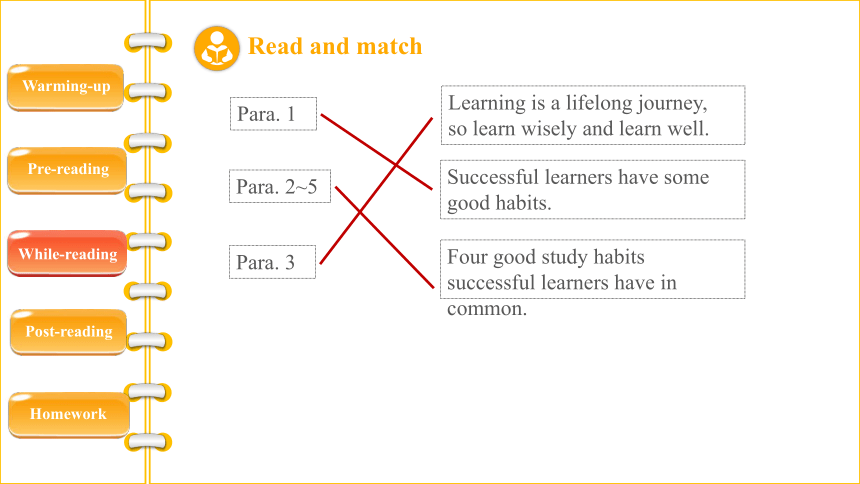
文档简介
(共26张PPT)
How can we become
good learners
Section B (2a~2e)
Unit 1
1. 能够读懂有关如何成为一名优秀的学习者的文章。
2. 能够根据寻读策略进行阅读并完成阅读任务,同时能够学会
使用词典获取多义词在特定上下文中的意义。
3. 培养学生养成积极的学习态度,学会结合自身实际选择有效的
学习方式,以获取学业上的成功。
重点
Teaching aims
While-reading
Homework
Post-reading
Pre-reading
Warming-up
重点
While-reading
Warming-up
Homework
Post-reading
Pre-reading
What learning habits do you have
Look and talk
1. listen to the teachers carefully in class
2. often ask the teachers for help
3. lack concentration in class or when doing homework
4. study with a group instead of working on your own
…
Which are good learning habits
While-reading
Homework
Post-reading
Pre-reading
Warming-up
Look and learn
be active in thinking
Can you list other good learning habits
What/How
Notebook
review what we have learned
While-reading
Homework
Post-reading
Pre-reading
Warming-up
draw mind map
connect with
what you’ll learn
something interesting
learning English
watching English movies
While-reading
Homework
Post-reading
Pre-reading
Warming-up
Look and guess
1. What is she doing
2. Is it a good learning habit Why
She is asking or answering questions.
Yes, it is. Because we can learn knowledge from asking
questions during or after class.
1. What does this passage
talk about
It talks about four good
learning habits to become
a successful learner.
Read and answer
While-reading
Homework
Post-reading
Warming-up
We can predict the text based on the title and the subtitle.
Pre-reading
While-reading
Can you find the structure of the passage
A.
While-reading
Homework
Post-reading
Warming-up
Pre-reading
While-reading
B.
C.
Generalization
( Para. 1)
Branches
( Para. 2~5)
Summary
( Para. 6)
Read and choose
While-reading
While-reading
Homework
Post-reading
Pre-reading
Warming-up
Para. 1
Four good study habits successful learners have in common.
Para. 2~5
Para. 3
Learning is a lifelong journey,
so learn wisely and learn well.
Successful learners have some good habits.
Read and match
Read Para. 1 and Para. 6 and answer
While-reading
Homework
Post-reading
Pre-reading
Warming-up
What kind of ability is everyone born with
Everyone is born with the ability to learn.
How can people learn well
It depends on their learning habits.
What’s the main idea of paragraph 1
Successful learners have some good habits in common.
Why is learning a lifelong journey
Because every day brings something new.
While-reading
Homework
Post-reading
Pre-reading
Warming-up
Habits Reasons
Creating an interest in what they learn
If you ______________ something, your brain is ___________ and it is also easier for you to ______________ it for a long time.
__________ and
learning from mistakes
Developing their ___________
Asking questions
If you learn something well, you will _______ it unless you ____ it.
It is not ________ to just study hard.
___________ comes from questioning.
Read Para. 2~5 and fill
are interested in
more active
pay attention to
enough
Knowledge
Practicing
study skills
forget
use
1. Creating an interesting in what they learn
2. Practicing and learning from mistakes
3. Developing their study skills
4. Asking questions
Read and number
While-reading
Homework
Post-reading
Pre-reading
Warming-up
Jack takes notes carefully and reviews what he has learnt by reading his
notes. _____
Sally often asks questions during or after class. _____
Alexander Graham Bell didn’t invent the telephone overnight. He
succeeded by trying many times and learning from his mistakes. _____
Lily hopes to learn English well and she likes music, so she listens to English songs. _____
1
2
3
4
Circle and find
While-reading
Homework
Post-reading
Pre-reading
Warming-up
brain n. connect v. overnight adv.
attention n. review v. knowledge n. ability n. active adj. wisely adv.
Circle these words in the passage and look up them in the dictionary. Try to find the correct meaning of each word in the passage.
Listen and read aloud.
Listen and read
While-reading
Homework
Post-reading
Pre-reading
Warming-up
While-reading
Fill and retell
Four good learning habits
Practice makes perfect
learning from mistakes
what they need to practice more
drawing mind maps
reading notes
While-reading
Homework
Post-reading
Pre-reading
Warming-up
According to the writer, everyone is born with the ability to
learn. Do you agree Why or why not
Do you agree with the sayings “Use it or lose it” or “Practice
makes perfect Why or why not
Work in groups and discuss
While-reading
Homework
Post-reading
Pre-reading
Warming-up
While-reading
Homework
Post-reading
Pre-reading
Warming-up
Read and choose
Learning any language can be a challenge and we have to accept that making progress takes time and effort. Here are some tips to help you build good learning habits and to make English language learning part of your life.
_____________
Learning any language doesn’t just happen. You need to make time for it and plan how and when you fit it into your life. Small regular chunks of study tend to work better than less frequent long chunks, so it’s not necessary to have lots of time, just try to spend five to ten minutes each day reviewing your vocabulary or doing an exercise.
_____________
Good language learners are self-critical and try to assess their own level of improvement. You can do this by regularly recording yourself and listening back to your recordings. There are lots of ways you can do this. You can use the webcam on your computer, or the video camera on your mobile phone.
A. Share your goals
B. Revise your vocabulary
C. Record and listen to yourself
D. Plan your learning
E. Try to imitate
D
C
While-reading
Homework
Post-reading
Pre-reading
Warming-up
______________
Everyone has an accent, even in their first language. However, it’s good to try to train your ear to hear different accents and to try to imitate them. You can do this by listening to very short extracts from audio or video and then trying to copy them. Try to copy the expression of the voice too, if the speaker is angry, sad or happy.
_____________
Increasing your vocabulary is one of the fastest ways to improve the level of your English. In order to remember the new words you learn during the your English lessons, you must review them regularly. Research shows that you will remember more if you review the words you learn at regular intervals after the lesson.
______________
People learn languages for many reasons, whether it’s to study abroad, for work or to travel, and the purpose for learning can impact on how you approach learning and what you study. If you tell your teacher why you are learning they should be able to help you and adapt their lessons to make sure you reach your goals more quickly.
I hope you can develop some of these habits and that they help you develop your language level.
E
A. Share your goals
B. Revise your vocabulary
C. Record and listen to yourself
D. Plan your learning
E. Try to imitate
B
A
Homework
Pre-reading
Warming-up
1. What good learning habits do you think are useful
2. Do you think that learning is a lifelong journey Why or why not
While-reading
Post-reading
Free talk
It is never too old to learn!
1. Write a sentence for each word in 2d.
2. Preview Section B (3a-3b).
Homework
While-reading
Homework
Post-reading
Pre-reading
Warming-up
1. Everyone is born with the ability to learn. 每个人天生都具有学习的能力。
Language points
While-reading
Post-reading
Pre-reading
Homework
Warming-up
(1) be born with 意为“天生具有”,常指生来就具有某种天分、性格或患有某种疾病等。
She was born with a gift for music.
【拓展】
① be born意为“出生;出世”,为被动语态,当说明某(些)人的出生情况时,be动词通常用was或were。
He was born in Beijing on October 9, 1998.
② born用作形容词时,意为“天生的”,通常置于名词前作定语。
He is a born poet.
(2) the ability to do sth. 意为“做某事的能力”,其中ability 意为“能力;
才能”。
He has the ability to speak English fluently.
While-reading
Post-reading
Pre-reading
Homework
Warming-up
(1) 此句中whether or not you can do this well是一个从句,作整个句子的主语,这种从句叫主语从句。单个主语从句作主语时,谓语动词用单数。
Whether they would support us was a problem.
(2) whether or not是英语从句的一个连词结构,意思和功能相当于whether,意为“是否”,常出现在宾语从句、主语从句中。whether or not也可写作whether…or not,or not放在句末。
I don’t know whether or not I should believe him.
(3) depend on 意为“视……而定;依靠”,其后可接名词、代词、动词-ing形式。它既不能用于进行时态,也不能用于被动语态。
The price depends on the quality.
2. But whether or not you can do this well depends on your learning
habits. 但是你是否能把这做好取决于你的学习习惯。
While-reading
Post-reading
Pre-reading
Homework
Warming-up
3. Studies show that if you are interested in something, your brain is
more active and it is also easier for you to pay attention to it for a
long time. 研究表明,如果你对某事感兴趣,你的大脑就会更活
跃,你也更容易长时间关注它。
(1) active 用作形容词,意为“活跃的;积极的”。常用短语:take an active part in sth. 意为“积极参与某事”。
You are supposed to be an active learner.
Encourage students to take an active part in discussions.
(2) pay attention to 意为“注意;关注”,其中to为介词,其后可跟名词、代词或动词-ing形式。
You’d better pay more attention to your pronunciation.
While-reading
Post-reading
Pre-reading
Homework
Warming-up
4. Good learners often connect what they need to learn with something
interesting. 好的学习者常常将他们需要学习的东西与感兴趣的东
西联系起来。
connect…with... 意为“把……和……连接或联系起来”,其中connect用作及物动词,意为“(使)连接;与……有联系”。connect的常用短语还有:be connected with… 意为“与……有关系;与……有亲戚关系”。
A railway connects Beijing with Shanghai.
【拓展】connect的名词形式为connection,意为“连接;关系”。
There’s a connection between pollution and the death of trees.
While-reading
Post-reading
Pre-reading
Homework
Warming-up
5. Even if you learn something well, you will forget it unless you use it.
即使有些东西你学得很好,如果不使用它,你也会忘记。
(1) even if 意为“即使;虽然”,有退一步设想的意味,用来引导让步状语从句,相当于even though。
Even if you work till midnight, you won’t finish it.
(2) unless是连词,意为“除非;如果不”,引导条件状语从句,相当于if...not,在许多情况下二者可以互换。
You will fail the exam unless you work hard.
= If you don’t work hard, you will fail the exam.
Don’t come unless I telephone you.
Bye-bye!
How can we become
good learners
Section B (2a~2e)
Unit 1
1. 能够读懂有关如何成为一名优秀的学习者的文章。
2. 能够根据寻读策略进行阅读并完成阅读任务,同时能够学会
使用词典获取多义词在特定上下文中的意义。
3. 培养学生养成积极的学习态度,学会结合自身实际选择有效的
学习方式,以获取学业上的成功。
重点
Teaching aims
While-reading
Homework
Post-reading
Pre-reading
Warming-up
重点
While-reading
Warming-up
Homework
Post-reading
Pre-reading
What learning habits do you have
Look and talk
1. listen to the teachers carefully in class
2. often ask the teachers for help
3. lack concentration in class or when doing homework
4. study with a group instead of working on your own
…
Which are good learning habits
While-reading
Homework
Post-reading
Pre-reading
Warming-up
Look and learn
be active in thinking
Can you list other good learning habits
What/How
Notebook
review what we have learned
While-reading
Homework
Post-reading
Pre-reading
Warming-up
draw mind map
connect with
what you’ll learn
something interesting
learning English
watching English movies
While-reading
Homework
Post-reading
Pre-reading
Warming-up
Look and guess
1. What is she doing
2. Is it a good learning habit Why
She is asking or answering questions.
Yes, it is. Because we can learn knowledge from asking
questions during or after class.
1. What does this passage
talk about
It talks about four good
learning habits to become
a successful learner.
Read and answer
While-reading
Homework
Post-reading
Warming-up
We can predict the text based on the title and the subtitle.
Pre-reading
While-reading
Can you find the structure of the passage
A.
While-reading
Homework
Post-reading
Warming-up
Pre-reading
While-reading
B.
C.
Generalization
( Para. 1)
Branches
( Para. 2~5)
Summary
( Para. 6)
Read and choose
While-reading
While-reading
Homework
Post-reading
Pre-reading
Warming-up
Para. 1
Four good study habits successful learners have in common.
Para. 2~5
Para. 3
Learning is a lifelong journey,
so learn wisely and learn well.
Successful learners have some good habits.
Read and match
Read Para. 1 and Para. 6 and answer
While-reading
Homework
Post-reading
Pre-reading
Warming-up
What kind of ability is everyone born with
Everyone is born with the ability to learn.
How can people learn well
It depends on their learning habits.
What’s the main idea of paragraph 1
Successful learners have some good habits in common.
Why is learning a lifelong journey
Because every day brings something new.
While-reading
Homework
Post-reading
Pre-reading
Warming-up
Habits Reasons
Creating an interest in what they learn
If you ______________ something, your brain is ___________ and it is also easier for you to ______________ it for a long time.
__________ and
learning from mistakes
Developing their ___________
Asking questions
If you learn something well, you will _______ it unless you ____ it.
It is not ________ to just study hard.
___________ comes from questioning.
Read Para. 2~5 and fill
are interested in
more active
pay attention to
enough
Knowledge
Practicing
study skills
forget
use
1. Creating an interesting in what they learn
2. Practicing and learning from mistakes
3. Developing their study skills
4. Asking questions
Read and number
While-reading
Homework
Post-reading
Pre-reading
Warming-up
Jack takes notes carefully and reviews what he has learnt by reading his
notes. _____
Sally often asks questions during or after class. _____
Alexander Graham Bell didn’t invent the telephone overnight. He
succeeded by trying many times and learning from his mistakes. _____
Lily hopes to learn English well and she likes music, so she listens to English songs. _____
1
2
3
4
Circle and find
While-reading
Homework
Post-reading
Pre-reading
Warming-up
brain n. connect v. overnight adv.
attention n. review v. knowledge n. ability n. active adj. wisely adv.
Circle these words in the passage and look up them in the dictionary. Try to find the correct meaning of each word in the passage.
Listen and read aloud.
Listen and read
While-reading
Homework
Post-reading
Pre-reading
Warming-up
While-reading
Fill and retell
Four good learning habits
Practice makes perfect
learning from mistakes
what they need to practice more
drawing mind maps
reading notes
While-reading
Homework
Post-reading
Pre-reading
Warming-up
According to the writer, everyone is born with the ability to
learn. Do you agree Why or why not
Do you agree with the sayings “Use it or lose it” or “Practice
makes perfect Why or why not
Work in groups and discuss
While-reading
Homework
Post-reading
Pre-reading
Warming-up
While-reading
Homework
Post-reading
Pre-reading
Warming-up
Read and choose
Learning any language can be a challenge and we have to accept that making progress takes time and effort. Here are some tips to help you build good learning habits and to make English language learning part of your life.
_____________
Learning any language doesn’t just happen. You need to make time for it and plan how and when you fit it into your life. Small regular chunks of study tend to work better than less frequent long chunks, so it’s not necessary to have lots of time, just try to spend five to ten minutes each day reviewing your vocabulary or doing an exercise.
_____________
Good language learners are self-critical and try to assess their own level of improvement. You can do this by regularly recording yourself and listening back to your recordings. There are lots of ways you can do this. You can use the webcam on your computer, or the video camera on your mobile phone.
A. Share your goals
B. Revise your vocabulary
C. Record and listen to yourself
D. Plan your learning
E. Try to imitate
D
C
While-reading
Homework
Post-reading
Pre-reading
Warming-up
______________
Everyone has an accent, even in their first language. However, it’s good to try to train your ear to hear different accents and to try to imitate them. You can do this by listening to very short extracts from audio or video and then trying to copy them. Try to copy the expression of the voice too, if the speaker is angry, sad or happy.
_____________
Increasing your vocabulary is one of the fastest ways to improve the level of your English. In order to remember the new words you learn during the your English lessons, you must review them regularly. Research shows that you will remember more if you review the words you learn at regular intervals after the lesson.
______________
People learn languages for many reasons, whether it’s to study abroad, for work or to travel, and the purpose for learning can impact on how you approach learning and what you study. If you tell your teacher why you are learning they should be able to help you and adapt their lessons to make sure you reach your goals more quickly.
I hope you can develop some of these habits and that they help you develop your language level.
E
A. Share your goals
B. Revise your vocabulary
C. Record and listen to yourself
D. Plan your learning
E. Try to imitate
B
A
Homework
Pre-reading
Warming-up
1. What good learning habits do you think are useful
2. Do you think that learning is a lifelong journey Why or why not
While-reading
Post-reading
Free talk
It is never too old to learn!
1. Write a sentence for each word in 2d.
2. Preview Section B (3a-3b).
Homework
While-reading
Homework
Post-reading
Pre-reading
Warming-up
1. Everyone is born with the ability to learn. 每个人天生都具有学习的能力。
Language points
While-reading
Post-reading
Pre-reading
Homework
Warming-up
(1) be born with 意为“天生具有”,常指生来就具有某种天分、性格或患有某种疾病等。
She was born with a gift for music.
【拓展】
① be born意为“出生;出世”,为被动语态,当说明某(些)人的出生情况时,be动词通常用was或were。
He was born in Beijing on October 9, 1998.
② born用作形容词时,意为“天生的”,通常置于名词前作定语。
He is a born poet.
(2) the ability to do sth. 意为“做某事的能力”,其中ability 意为“能力;
才能”。
He has the ability to speak English fluently.
While-reading
Post-reading
Pre-reading
Homework
Warming-up
(1) 此句中whether or not you can do this well是一个从句,作整个句子的主语,这种从句叫主语从句。单个主语从句作主语时,谓语动词用单数。
Whether they would support us was a problem.
(2) whether or not是英语从句的一个连词结构,意思和功能相当于whether,意为“是否”,常出现在宾语从句、主语从句中。whether or not也可写作whether…or not,or not放在句末。
I don’t know whether or not I should believe him.
(3) depend on 意为“视……而定;依靠”,其后可接名词、代词、动词-ing形式。它既不能用于进行时态,也不能用于被动语态。
The price depends on the quality.
2. But whether or not you can do this well depends on your learning
habits. 但是你是否能把这做好取决于你的学习习惯。
While-reading
Post-reading
Pre-reading
Homework
Warming-up
3. Studies show that if you are interested in something, your brain is
more active and it is also easier for you to pay attention to it for a
long time. 研究表明,如果你对某事感兴趣,你的大脑就会更活
跃,你也更容易长时间关注它。
(1) active 用作形容词,意为“活跃的;积极的”。常用短语:take an active part in sth. 意为“积极参与某事”。
You are supposed to be an active learner.
Encourage students to take an active part in discussions.
(2) pay attention to 意为“注意;关注”,其中to为介词,其后可跟名词、代词或动词-ing形式。
You’d better pay more attention to your pronunciation.
While-reading
Post-reading
Pre-reading
Homework
Warming-up
4. Good learners often connect what they need to learn with something
interesting. 好的学习者常常将他们需要学习的东西与感兴趣的东
西联系起来。
connect…with... 意为“把……和……连接或联系起来”,其中connect用作及物动词,意为“(使)连接;与……有联系”。connect的常用短语还有:be connected with… 意为“与……有关系;与……有亲戚关系”。
A railway connects Beijing with Shanghai.
【拓展】connect的名词形式为connection,意为“连接;关系”。
There’s a connection between pollution and the death of trees.
While-reading
Post-reading
Pre-reading
Homework
Warming-up
5. Even if you learn something well, you will forget it unless you use it.
即使有些东西你学得很好,如果不使用它,你也会忘记。
(1) even if 意为“即使;虽然”,有退一步设想的意味,用来引导让步状语从句,相当于even though。
Even if you work till midnight, you won’t finish it.
(2) unless是连词,意为“除非;如果不”,引导条件状语从句,相当于if...not,在许多情况下二者可以互换。
You will fail the exam unless you work hard.
= If you don’t work hard, you will fail the exam.
Don’t come unless I telephone you.
Bye-bye!
同课章节目录
- Unit 1 How can we become good learners.
- Section A
- Section B
- Unit 2 I think that mooncakes are delicious!
- Section A
- Section B
- Unit 3 Could you please tell me where the restroom
- Section A
- Section B
- Unit 4 I used to be afraid of the dark.
- Section A
- Section B
- Unit 5 What are the shirts made of?
- Section A
- Section B
- Review of Units 1-5
- Unit 6 When was it invented?
- Section A
- Section B
- Unit 7 Teenagers should be allowed to choose their
- Section A
- Section B
- Unit 8 It must belong to Carla.
- Section A
- Section B
- Unit 9 I like music that I can dance to.
- Section A
- Section B
- Unit 10 You're supposed to shake hands.
- Section A
- Section B
- Review of Units 6-10
- Unit 11 Sad movies make me cry.
- Section A
- Section B
- Unit 12 Life is full of the unexpected
- Section A
- Section B
- Unit 13 We're trying to save the earth!
- Section A
- Section B
- Unit 14 I remember meeting all of you in Grade 7.
- Section A
- Section B
- Review of Units 11-14
